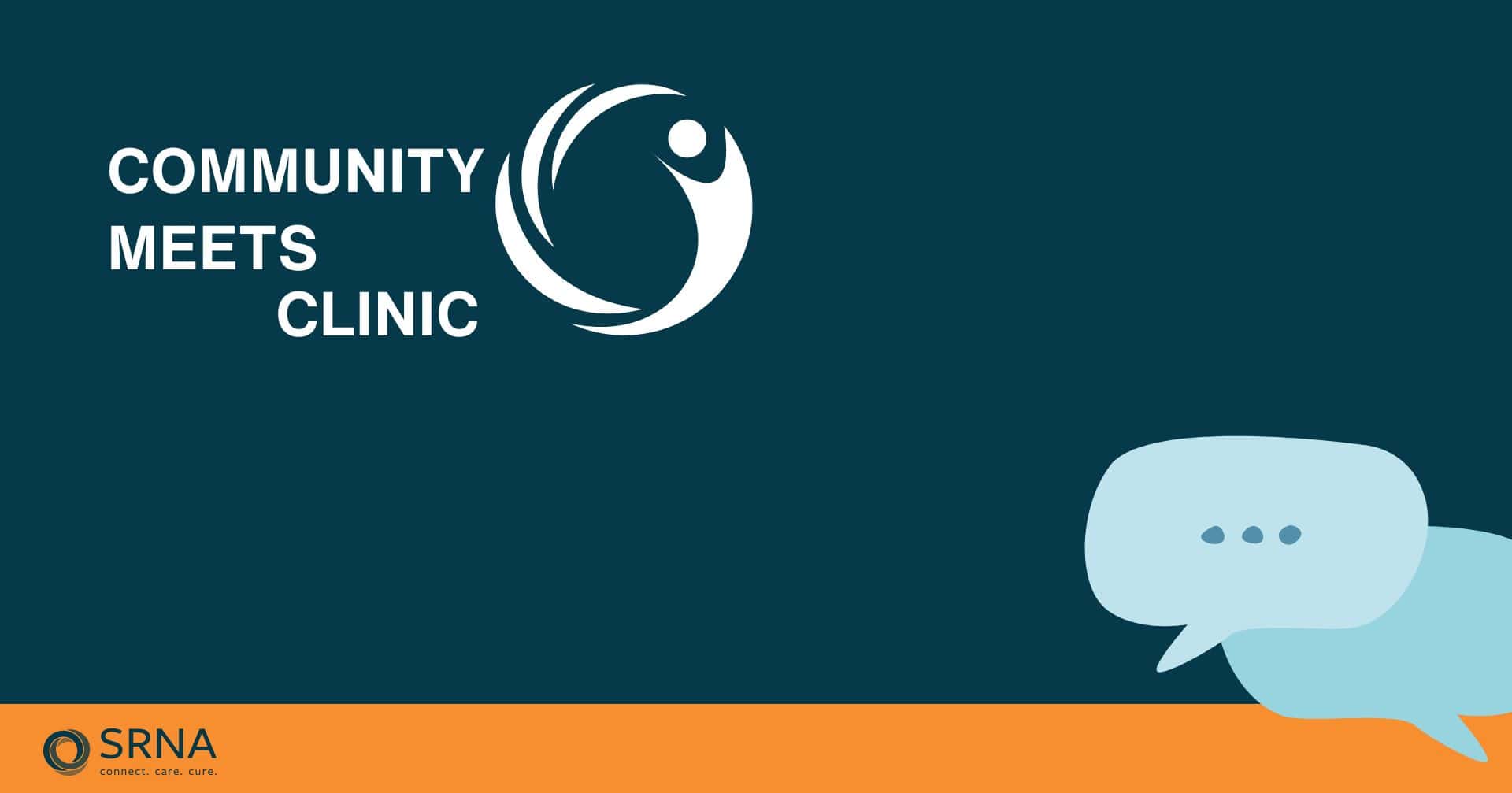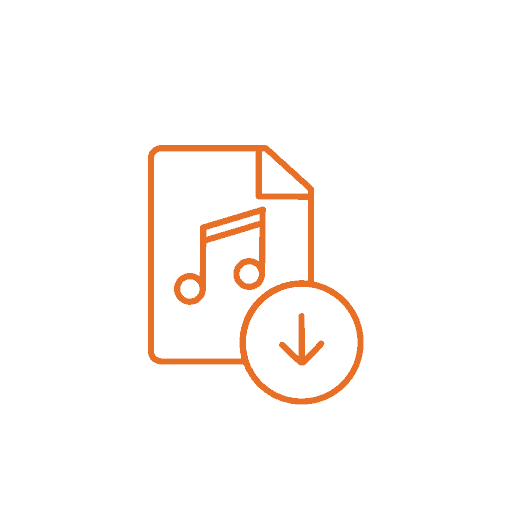Drs. Kelsey Poisson and Camille Wilson
August 24, 2023
For this episode of “Community Meets Clinic,” Rebecca Whitney of SRNA was joined by Dr. Kelsey Poisson and Dr. Camille Wilson of Nationwide Children’s Hospital in Columbus, Ohio. Dr. Kelsey Poisson shared what led her to pediatric neurology and neuroimmunology, as well as her work researching social determinants of health and pediatric neuromyelitis optica spectrum disorder (NMOSD). Dr. Wilson discussed her work as a clinical psychologist with specialty training in neuropsychology. She spoke about her interest in long-term outcomes from a neurocognitive perspective of people who experience events with a neuroimmune basis. Next, they gave an overview of the multidisciplinary team at Nationwide Children’s Hospital and which specialists a new patient might expect to see. Dr. Poisson and Dr. Wilson also described how they look after themselves and stay grounded. Finally, they provided details on Neuroimmune Family Education Day which will take place on September 9, 2023. You can view Dr. Poisson’s medical profile here and Dr. Wilson’s medical profile here.
Transcript
[00:00:02] Rebecca Whitney: Welcome to the Community Meets Clinic podcast, a collaborative podcast to introduce the clinicians, clinician scientists, and healthcare personnel, working directly with individuals and families facing a rare neuroimmune diagnosis. Hear directly from those in the clinic and connect with the individuals whose focus is promoting quality of life for those diagnosed with a rare neuroimmune disorder. My name is Rebecca Whitney, Associate Director of Programs and Community Support with Siegel Rare Neuroimmune Association or SRNA. Today we meet two clinicians from Nationwide Children’s Hospital Neuroimmunology Clinic, Dr. Kelsey Poisson and Dr. Camille Wilson.
[00:00:45] Dr. Poisson is a board-certified child neurologist at Nationwide Children’s Hospital and Assistant Professor of Clinical Pediatrics and Neurology at the Ohio State University College of Medicine. She received her medical degree from Wake Forest School of Medicine prior to completing her Child Neurology Residency at Cincinnati Children’s Hospital Medical Center. She pursued a fellowship in Pediatric and Adult Neuroimmunology at the University of Alabama at Birmingham, in Children’s of Alabama, prior to joining the team at Nationwide Children’s Hospital. Her clinical and research interests include pediatric neuromyelitis optica spectrum disorder, social determinants of health, transitions of care to adulthood, and long-term quality of life in pediatric-onset multiple sclerosis.
[00:01:33] Dr. Wilson is a board-certified clinical neuropsychologist. She graduated with a doctorate in Clinical Psychology from the University of Maryland, Baltimore County. She completed a predoctoral Clinical Psychology internship and postdoctoral fellowship at Nationwide Children’s Hospital with a specialization in Pediatric Neuropsychology. She is an Assistant Clinical Professor in the Department of Pediatrics at the Ohio State University. She is actively involved in clinical research to better understand neurocognitive and psychosocial functioning of individuals affected by neuroimmune diseases. She cares deeply for helping patients and families learn how to navigate their diagnoses to achieve the best outcomes at home, school, and their community.
[00:02:23] Thank you so much for joining me today, Dr. Wilson and Dr. Poisson. I’m really excited to be able to have you both online today and to learn a bit more about you, as well as the Nationwide Children’s Neuroimmunology Clinic. So, we’ll start with Dr. Poisson if you can tell me a little bit about yourself and what led you to pediatric neurology, and in particular neuroimmunology.
[00:02:51] Dr. Kelsey Poisson: So, I was always someone who really liked to get into the nitty gritty of things. I think, really thinking about the molecular mechanisms, underlying disease, and that really transformed over time into learning about the immune system and its impact on disease. In medical school, I realized I wanted to treat children just, you know, they’re so resilient, you get to puzzle through a baby’s exam, they won’t tell you what’s wrong with them or you get to bargain with the teenager and really bring the family together to make a decision. And so that really got me hooked to pediatric side of things.
[00:03:24] And neurology overall was the puzzle and really being the neuro immunologist ultimately to sit down and really think about a case in a holistic way, really go through all the data, go through the history again and really just get to the bottom of things and work together with families to move forward. And that really just unified a couple of my desires to really be there when kids are really sick in the hospital, really sick autoimmune encephalitis patient and then get to see them and follow up and watch them grow and recover over time. And so just really being there in the scariest moments and also the victories at a later time, really got me pretty addicted and just loving this field.
[00:04:12] Rebecca Whitney: I love to hear that, and I really appreciate when you say that it’s about the family as well. I think that’s the case with any one of these diagnoses, but particularly in pediatrics, it certainly is a diagnosis that impacts the entire family. So, thank you. And do you have any particular interest areas that you are working on in research with regards to these disorders?
[00:04:41] Dr. Kelsey Poisson: Yes, absolutely. I’m getting integrated into our programs here, which Dr. Wilson can certainly chat more about as well. But my initial projects and interests have revolved around social determinants of health. And so, these are the conditions in which our kiddos are born, grow up, ultimately work, and hopefully thrive and we know that a lot of these factors can impact not only our day-to-day healthcare experience and our lives, but also ultimately down the line, our chronic health conditions, just thinking about that chronic stress and what we could experience in childhood. And so, my initial work has looked at social determinants of health and pediatric neuromyelitis optica spectrum disorder. And we really have identified some health disparities that we’re hoping to further explore.
[00:05:17] And so my focus is to really broaden this work and do it in a prospective way, meaning that we really can try to come up with how can we truly help families? Because if we’re just looking at our patients in the hospital, we’re not doing our best job. We need to really look at what’s going on at home and the environments, you know, the influences of not speaking English and navigating the healthcare system, and just all other factors. And so, integrating that with my passion for diagnostic delays has really been my initial focus and hoping to build further on that.
[00:06:03] Rebecca Whitney: Excellent. Sincerely appreciate that work. It’s so incredibly important. And Dr. Wilson, what led you to a career in pediatric neuropsychology? And if you want to talk just a little bit about what exactly neuropsychology entails, that’d be great too.
[00:06:24] Dr. Camille Wilson: Sure. Absolutely. So, by training, I’m a Clinical Psychologist, but I have specialty training in neuropsychology and neuropsychology is the study of brain and behavior relationships. And kind of like how Dr. Poisson talked about her interest in understanding the brain and what can affect functioning, I’ve been interested similarly from a cognitive side, how our different medical conditions can affect one’s thinking skills. And so I’ve really enjoyed being able to work with children, teens and young adults and help them better understand their neurocognitive profile, like what are their areas of strength, what are their areas of challenges and what are some supports that we could recommend to put into place to help them be successful in their home setting, at school, at work, and just really being able to find a way for them to thrive in their day to day setting.
[00:07:24] Rebecca Whitney: Great. Thank you so much. And do you have specific areas or concerns within the rare neuroimmune disorders that have piqued your interest in neuropsychology?
[00:07:37] Dr. Camille Wilson: Absolutely. I think as many of us know who live in this world, it’s not common diagnoses that we see every day. And I think for many of our individuals diagnosed with a rare neuroimmune disorder, there’s a lot of questions that we still don’t understand. We don’t always know who may go on to have a relapse, what the course may look like for an individual diagnosed with a rare neuroimmune disorder. And my own personal interest has been to look at long term outcomes from a neurocognitive perspective of people who experience events that have a neuroimmune basis.
[00:08:16] And so some of our research that Dr. Poisson and I are working on together are to look at some of the ways that the brain recovers and heals after these acute episodes and how that recovery can affect one’s thinking skills and maybe how we can better understand supporting individuals who may have areas of difficulty and thinking about those long term supports for them as they go back out into their community and function.
[00:08:46] Rebecca Whitney: Great. Thank you. I really appreciate that work. It’s something that’s often overlooked, especially if the diagnosis may not necessarily have included specific areas of inflammation in the brain. But we know that there’s still a component of cognitive function that needs to be considered. So, thank you.
[00:09:08] Dr. Camille Wilson: Yeah, absolutely. I think it also encompasses not just the cognitive, but also the social and emotional. Like Dr. Poisson, and you mentioned, I think a diagnosis of a rare neuroimmune disorder affects everyone in every part of their life, right? It’s not just the physical body, but it affects how they relate to themselves in their home setting, with their family members, with their friends in their schools. And so that’s a large component of what we’re also interested to better understand is sort of that psychological and social component as well.
[00:09:43] Rebecca Whitney: Great. Thank you. And can you share more about your specific neuroimmunology multidisciplinary clinic team? What other specialists might a new patient expect to see if they have an appointment with you? How does a new patient typically get connected with you and what might that look like?
[00:10:09] Dr. Kelsey Poisson: Dr. Wilson has been here longer than I have, so she can certainly comment too, but I can address what I’m trying to implement here is that transition from those patients that we meet in the hospital for the first time, you know, how do we establish that connection and that collaboration with the team in the hospital, so we can meet families when they’re at those scariest moments, right? And be a part of the workup, a part of the recommendations, but also ease that transition to that first clinic visit, which can be very overwhelming, and meeting all of us, so that part of my role is, the patients specifically that are admitted into the hospital. And so that’s where some of our patients come from, some of our patients will come from pediatricians, or from other neurology providers who want to subspecialty opinion as well. And then Dr. Wilson, would you like to talk about all the different providers in our clinic that has been built?
[00:11:05] Dr. Camille Wilson: Yeah, absolutely. So, we have a multidisciplinary clinic where when a patient and family first come to our outpatient clinic, they meet multiple providers including our neuroimmunologists, like Dr. Poisson and Dr. Magana. We also have our pediatric rheumatologist who will also evaluate children from that autoimmune perspective and provide that level of expertise. We have a pretty strong psychosocial presence in our clinic that includes pediatric psychology, psychiatry and neuropsychology. And so, we’re looking at all different aspects of an individual’s level of functioning from a psychosocial and cognitive perspective.
[00:11:52] We also have our pharmacist who will consult with families about medication treatments, help facilitate the approvals and sort of the logistics around that and answer any questions families may have around some of the medical treatments of choice—those disease modifying therapies—and help families better understand what are those options and what do those look like. So, that’s our core there, and we also have a wonderful nurse coordinator who really is the hub of our clinic, and she keeps us all on our toes and really helps facilitate, I think, strong communication with our families. And so, I think we’ve been very lucky to have Angel and Allie both in our clinic who help and can be the heart—I think—of it all, within our team.
[00:12:46] Dr. Kelsey Poisson: And I will say, this psychosocial focus was the reason that I came to Nationwide Children’s Hospital. It is rare that you find a clinic like this one where patients can really see multiple providers in one visit and address what’s really impacting their quality of life the most on a day-to-day basis. A lot of our kids, yes, they’re trying to understand a new diagnosis, but what’s really important to them may be very different from what’s important to me, in terms of, let’s start a medication. And just having all of us together in one room to really address the most basic needs, and the most important needs of our children and their families, and our young adults, is just wonderful, and I feel very blessed to have joined the team here.
[00:13:28] Rebecca Whitney: Yes. I love how it is unique in that way, where there is such a focus on, like you said earlier too, that holistic approach. It’s more than just a neurological diagnosis. It’s more than just, you know, are we going to have to be on long term therapies? What does this mean? It impacts every aspect of life. So, thank you.
[00:13:56] Dr. Camille Wilson: I think that’s a nice way to put it, Rebecca. We treat the person not just the disease and really making sure that each team member brings that level of expertise that enriches the discussion with families, but also with one another so that we’re really thinking about these different pieces to provide that highest level of care.
[00:14:18] Rebecca Whitney: Yes. And talking about working with families and children, these disorders can be life altering. It changes things for the child, the individual diagnosed, the parents, their siblings. And I can imagine as clinicians, especially when you’re dealing with so much unknown with these disorders as well, that it can be incredibly difficult. So, how do you as individuals take care of yourselves? How do you stay grounded? How do you reenergize so that you don’t lose yourself in the emotions and sometimes the trauma of these diagnoses along with children and their families? Do you want to start, Dr. Poisson?
[00:15:06] Dr. Kelsey Poisson: Sure. And I think it is such a great question because it can be difficult at times, right? But I think that the people that have gone into a field such as this do it because we have a passion for caring for children and their families, even in the darkest of times, and I think that can lead to some moral distress, when we’re in the thick of it, with our families. But I think what really is important, for me, and I derive so much meaning from walking that journey with our families. And so it is distressing at times, but it’s remembering the meaning of even if we’re dealing with a permanent disability, even the potential for death, that we are walking that journey and that we are making the difference that we can and making sure even if it’s not that we can fix what’s causing a disease or we can’t give it a cure, we can walk that journey and make that journey a little bit less difficult.
[00:16:04] And so I think that’s really important in how I conceptualize what I do, but it is important outside of the hospital too to take some time. For me being outside is what I like to do. And so, whether we’re just hiking locally or every so often, my partner and I have to recharge, and we’ll take a big trip. My favorite trip was when I went to Europe to hike the Tour du Mont Blanc. So, it’s a 10-day backpacking trip through France, Italy, and Switzerland and so those are the things that I like to do. But I know that as long as anyone can find the things that they’re passionate about, it really helps.
[00:16:40] Rebecca Whitney: Yes. Reconnecting with nature, breathing the fresh air, and getting that physical activity. And how about you, Dr. Wilson?
[00:16:52] Dr. Camille Wilson: Yeah, I think it’s such a thoughtful question about what does self-care look like? I think, as providers, we’re often teaching our families how to take care of themselves, in the midst of what can be a very difficult diagnosis and recognizing that for many of our families, this is a marathon. It’s not a sprint, that this is something that they may be living with a long time and figuring out how to pace themselves. I think, even in the hardest moments when symptoms aren’t remitting or we’re seeing a lot of impact from the diagnosis, I think it’s been so inspirational to like work with families who want to rally around their loved ones who want to support each other.
[00:17:38] And I think that’s often been a tremendous source of encouragement and ways to find something to celebrate. Like even in the hardest things, sometimes we can find something really great to celebrate like someone laughed for the first time or they’re taking those steps and getting stronger and stronger. I think I had a dad come to me one day and say my kid ran, the other day. That was so great, like they had had so much motor difficulties after their hospitalization. It was wonderful to see some of that progress in PT. And so, I think finding ways to celebrate those moments with families and being able to highlight that I think has been tremendous for me, to remind me that there are often ways even the small things that we can celebrate with our families.
[00:18:24] And I think like Dr. Poisson said it, so key to know how to recharge yourself too and to recognize like when you might need to just pause, because I think we’re all deep carers, that we wouldn’t be in this field if we weren’t in the helping profession. But to recognize when it’s time maybe to take a break from the hard and to do things that feed your soul. And so, for me, that’s a lot of art and being outside. So, finding ways to create beauty or create things that will be loved and appreciated by other people. So, I like to knit, I like to quilt, but I also love being active in the outdoors too. So, I think both of those feed different parts of me and help keep me feeling balanced.
[00:18:37] Rebecca Whitney: I love that. I particularly love that you love to knit. I’m a knitter as well. So, thank you both very much for sharing that. And actually, you have a special event coming up here on September 9th. It’s the Neuroimmune Family Education Day. This is going to be the second year that you’ve put this day on and it’s coming together pretty impressively. I love what you’ve all done so far. Can you share a bit more about the event, the intended audience, how it came to be and what families may expect from the event by attending?
[00:20:03] Dr. Camille Wilson: Yeah, I’m happy to start and then Dr. Poisson if you want to chime in with other thoughts too. So, our Education Day really came from a desire to help our families connect with one another. Recognizing that sometimes when you’re navigating the journey of a new diagnosis, it can feel really isolating and you might feel really alone or not sure of where to turn. And so, we wanted to help provide families a way where they can come connect with your providers in a unique, less formal setting, but then also to connect with other families, teens, children, parents and caregivers, so that they can connect with one another and have a shared time to learn more about neuroimmune disorders and care components, but then also to share experiences with each other to really create a sense of community.
[00:21:04] So for this one-day event, we’re welcoming any individual who has been diagnosed or has a loved one with a neuroimmune disorder and they are invited, we’re inviting everyone from school age children into adulthood. We’re welcoming parents, caregivers, anyone who wants to learn how to better understand what it means to live with a neuroimmune diagnosis and how to better care for one another in this process. So, we’ll have a variety of speakers. And Dr. Poisson, do you want to talk a little bit about who will be coming and what that’ll look like?
[00:21:45] Dr. Kelsey Poisson: Absolutely. And so, first of all, I’m just so excited to join this effort. This is something that was started last year before I arrived. And we’ve been even able to build upon that and grow this event and try to provide education for even more families and connect even more families. And so, in terms of our focus, it’s a broad focus. I’m actually the keynote speaker and so I’ll be talking about, beyond the medication. And I feel like, especially with our teenagers in the hospital and our families, this is a life-changing diagnosis. And it can feel like a lot of things are out of our control. And so, I like to focus on, “Okay, we’ve started the medication, what can we control?” “What are the things that we can do to help with our disease process?” Diet, exercise, vitamin D, keeping healthy. So, really delving into beyond the medication choice and what we can do to promote a good quality of life.
[00:22:44] We also have our neuro ophthalmologist, Dr. Varma coming to talk about ophthalmologic concerns in neuroimmune disorders. And we have a variety of other speakers focusing very, very much on the psychosocial aspects of the disease. And I think most importantly, we have a patient panel and so we’re having patients come not only from our institution, but from outside our institution to really talk about their experience, going through these diagnoses and the day to day themselves and with their family. So, to connect, not just our patients, but patients, from elsewhere too to discuss these experiences and really be able to then have some time with each other to really talk about their own concerns.
[00:23:30] Rebecca Whitney: Yeah, I love it. Truly connecting the different stakeholders, it’s not the right word that I want to use, but the different members of the community with one another on a more personal level. So, I really like that, and I think it’ll be a wonderful day.
[00:23:53] Dr. Camille Wilson: Rebecca one of the things I love—sorry to interrupt—I just wanted to add, I think we’re really excited to partner with you all, because I think SRNA shares that vision of creating a community and connection for our individuals diagnosed with a neuroimmune disease, just to have that collaboration and partnership with you all has been tremendous, because I think you all share the same heart and passion with us. And so, I think it’s been a really nice synergy to put those together. We’ve invited some other organizations, family facing organizations, who also support families diagnosed with a neuroimmune disorder. So, we’re excited to bring all of these folks together into a space where we can be talking, sharing, laughing together, and just really talking about some of the big questions that people may have about their care, now and going forward.
[00:24:52] Dr. Kelsey Poisson: And as you mentioned, going forward, Dr. Wilson, my training also focused a lot on adult neuroimmunology. And so, a passion of mine is transitions of care and that’s a huge focus of our clinic, through a program starting at age 12 to really prepare our kiddos for when they’re into adulthood and when they’re taking charge of their healthcare journey. And so, a large part of our programming is directed towards young adults, but also our teenagers and including our colleagues at Ohio State University Medical Center in the MS Center and the Neuroimmunology Center are coming over to also explain their role and to talk about the transition process and what that means going forward and how we can support our patients and families.
[00:25:38] Rebecca Whitney: That’s great. That’s such a key component of pediatric medical care in general. That is so often overlooked is, “Yes, we’re focused on these children right now as they are, but they will become adults and they will need to take charge of their own care, make those decisions.” And speaking as a parent who’s gone through some of those transitions myself, it’s a starkly different world in the realm of adult medicine. So that’s awesome that you have a focus there. And I think that Education Day just being able to have that and talk about that openly with kids and parents is a really unique opportunity.
[00:26:29] So hopefully, we’ll have the chance to help some additional individuals take the lead on moving through those transitions that can be so difficult, but well, thank you both so much. And one other thing I just want to make sure so that anyone who’s watching or listening understands when we talk about rare neuroimmune disorders. So, as SRNA we advocate for acute flaccid myelitis, acute disseminated encephalomyelitis, MOG antibody disease, neuromyelitis optica spectrum disorder, optic neuritis, transverse myelitis, but it can also include individuals diagnosed with autoimmune encephalitis, multiple sclerosis… Are there any others that you see that are in that rare neuroimmune disorder space that you would welcome joining for that Education Day?
[00:27:29] Dr. Kelsey Poisson: I’d say absolutely. And so, myself and Dr. Idris, are rheumatologists. We see patients that with rheumatologic conditions. So, autoimmune diseases that can affect the body, but that sometimes that brain is that innocent bystander of that autoimmune disease. And in rare cases, the presentation with the neurologic symptoms can be the initial manifestation of a systemic or an autoimmune disease elsewhere in the body. And so, things like sarcoidosis, lupus, those types of conditions we also see in our clinic, and I have experience with and would welcome at our Education Day as well.
[00:28:09] Rebecca Whitney: Awesome. Thank you so much. And did you have anything else you wanted to add, Dr. Wilson?
[00:28:15] Dr. Camille Wilson: No, I think Dr. Poisson captured it well.
[00:28:19] Rebecca Whitney: All right. Well, thank you both so much. I look forward to seeing you in person, in a few weeks, and for anyone that wants to get in contact with you all or with the neuroimmunology clinic, we will have a link along with this podcast on YouTube and anywhere else anyone who listens to podcasts, directly to your profiles at Nationwide Children’s. Thank you so much.
[00:28:48] Dr. Camille Wilson: Thanks, Rebecca. It’s great to join you.
LISTEN & SUBSCRIBE
TO PODCAST
DOWNLOAD MP3
DOWNLOAD TRANSCRIPT







 Camille S. Wilson, PhD
Camille S. Wilson, PhD

